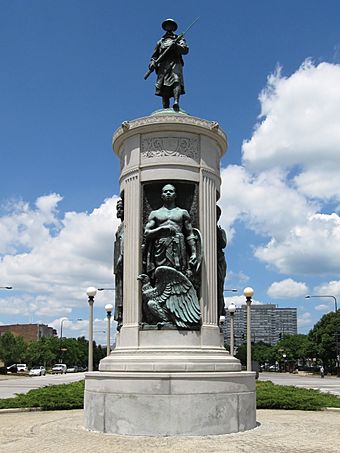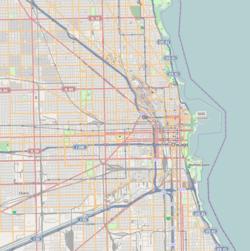Victory Monument (Chicago) facts for kids
|
Victory Sculpture
|
|
|
U.S. Historic district
Contributing property |
|

View facing north
|
|
| Location | 35th Street and King Drive Chicago, IL |
|---|---|
| Built | 1927 |
| Architect | John A. Nyden |
| Sculptor | Leonard Crunelle |
| MPS | Black Metropolis TR |
| NRHP reference No. | 86001089 |
Quick facts for kids Significant dates |
|
| Added to NRHP | April 30, 1986 |
The Victory Monument is a special statue in Chicago, Illinois. It was built in 1927 by sculptor Leonard Crunelle. This monument honors the brave African-American soldiers of the Eighth Regiment of the Illinois National Guard. They fought in France during World War I.
You can find the monument in the Black Metropolis-Bronzeville District of Chicago. It became a part of the National Register of Historic Places in 1986. Later, in 1998, it was named a Chicago Landmark. Every year, on Memorial Day, a special ceremony is held here to remember the soldiers.
Contents
What is the Victory Monument?
The Victory Monument is a tall, white granite statue. On top, there is a bronze sculpture of a "doughboy" soldier. A doughboy was a nickname for American soldiers during World War I.
The monument also has three bronze pictures carved into its sides. These pictures show important figures:
- Victory Panel: This shows an African-American woman. She represents motherhood and holds a branch, which means victory.
- Columbia Panel: This shows a female figure wearing a helmet. She holds a tablet with the names of battles where African-American soldiers fought.
- African-American Soldier Panel: This shows a strong African-American soldier. He is from the 370th Infantry, a unit that fought in France. An eagle is shown in front of him.
Honoring Heroes
The monument was built in 1927 in the "Bronzeville" neighborhood of Chicago. This area was home to the "Fighting Eighth" Regiment. On a bronze panel, you can see the names of 137 members of the Eighth Infantry. These soldiers lost their lives during World War I.
The Eighth Regiment later became the 370th U.S. Infantry. This regiment fought in many big battles during the war. They were even the last group chasing the German forces in France. This happened just before the war ended on November 11, 1918. The doughboy soldier on top of the monument was added later, in 1936.
Special Events and History
For many years, the Bud Billiken Parade has traveled along King Drive, which is near the monument. This parade often starts very close to the Victory Monument.
The monument has recently received money to be cleaned and repaired. This is part of activities celebrating 100 years since World War I.
Features of the Monument
The Victory Monument has four bronze panels with carvings. It also has the soldier sculpture on top. North of the monument, there is a special court with four plaques. These plaques honor important people like Robert Henry Lawrence, Jr., Truman Gibson, Sr./Truman Gibson, Jr., Franklin A. Denison, and George R. Giles.
To the south of the monument, there is a flagpole. It flies the United States flag, the Municipal Flag of Chicago, and the POW/MIA flag.
Images for kids
-
The Fountain of the Great Lakes was almost placed where the Victory Monument is now. It is at the Art Institute of Chicago.
Gallery
See also
 In Spanish: Monumento a la Victoria (Chicago) para niños
In Spanish: Monumento a la Victoria (Chicago) para niños








